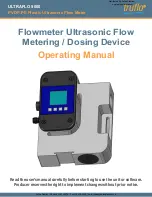
3
Controls Page
Oscillator Amp
This section contains the Amplifier parameters of the 2 oscillators. At the top left corner of every
oscillator section, there’s a switch that lets you switch the oscillator on or off (Mute). At the top right
corner of the oscillator section, you will find 2 switches ‘
A
’ & ‘
P
’, A stands for ‘Amplifier’ and P for
‘Pitch’ (more about this later). To be able to edit the parameters of the amplifier, be sure that the ‘
A
’
switch is turned on (lights up).
Amp Envelope
An Amplifier uses an Envelope to control the overall loudness (or amplitude) of the sound over
time. Envelopes are activated by pressing the keys on a keyboard.
ATK
(Attack): Sets the attack time of the volume envelope. Sets the time taken to reach peak
amplitude after a note is played.
DEC
(Decay): Sets the decay time of the volume envelope. Sets the time taken for the
amplitude to ramp down to the sustain level.
STN
(Sustain): Sets the sustain time of the volume envelope, as a percentage of peak
amplitude.
RLS
(Release): Sets the release time of the volume envelope. Sets the time taken for signal
amplitude to ramp back down to zero.
Amp Modulators
VEL
(Velocity Sense): Sets the volume of the sound depending on how hard the key is struck.
AFT
(Aftertouch to Volume): Sets the amount of volume when pressure is applied after the
keyboard has been struck. It raises the volume when pressure is applied after the keyboard
has been struck.
MDW
(Modulation Wheel to Volume): Sets the volume amount when the modulation wheel
is dragged up or down. When dragged up, It raises the volume.
KFL
(Key Follow): Sets the amount of volume across the keyboard. When turned up, the
volume is getting higher the higher you play the keys on the keyboard.
Amp Main
LVL
(Level): Sets the volume level of the oscillator.
PAN
: Sets the placement of the oscillator in the stereo field.
Содержание Blue Orb Trilogy
Страница 1: ......
Страница 3: ...2 Screenshots...





































